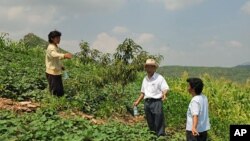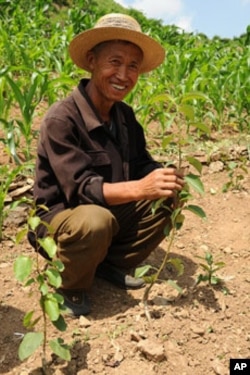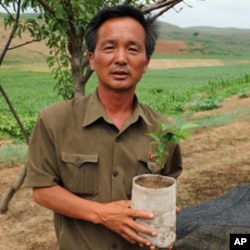Deforestation has contributed to major floods while also worsening chronic hunger problems in North Korea but now the communist-led government is supporting a small but growing effort to recover the hillsides with fruit and nut trees.
For more than four decades after its creation in the wake of the Second World War, North Korea relied on its communist ally, the Soviet Union, to provide fertilizer for its farms. When the Soviet Union collapsed in 1989, food production in North Korea plummeted.
Environmental mess
Deputy Director Marcus Noland of the Washington-based Peterson Institute for International Economics has studied North Korea since 1995. He says as food production fell, forests in mountainous areas were cleared to grow more crops.
"And as trees were cut down on the hillsides, that contributed to soil erosion, river silting, which exacerbated the seasonal flooding problems," says Noland. "So, the North Koreans have ended up with a real environmental mess on their hands."
Major floods hit North Korea in 2007 and again this summer. But the environmental issues first got the government's attention in 1995, when catastrophic floods damaged about 40 percent of the country's rice paddies and contributed to a famine that killed an estimated two million people.
"Then the government said, 'Okay, we need to do something,'" says Xu Jianchu, a senior scientist at the World Agroforestry Center, a global research institution.
According to Xu, different government ministries had different ideas concerning what to do about the floods. In many places, people had cut down trees to grow their own food. Xu says the agriculture ministry wanted trees back on the mountainsides and people's crops off them.
Trees and crops together
But the environment ministry took a different view. Working with the Swiss aid agency, it started a small pilot project in 2002 to plant fruit and nut trees and medicinal bushes on the sloping hillsides, alongside people's crops.
"We get the tree cover back, and, second, also, we do provide the needs of the local people for food," says Jianchu.
The World Agroforestry Center joined the project in 2008. Earlier in the decade, Pyongyang had begun loosening its tight controls over the country's food production. Xu says the government organized households into user groups which were given autonomy to choose what kinds of trees to grow. That was important, Xu says, because for one thing, the government had been offering only pine, poplar and larch trees for hillside planting - three species the farmers didn't want really don't want because they were not related to their food security.
The user groups were allowed to establish their own fruit-tree nurseries to expand production. With help terracing the steep hills and improving their farming practices, Xu says food production has increased, and farmers are even selling their surplus in local markets.
However, it is difficult to get an accurate picture of how much they are producing. According to Xu, people tend to say they grew less than they did because they believe the government will take away their surplus.
"They try to always under-report what they harvest because sometimes they are still afraid the government will take away if they produce too much," he says.
A good start
While the policy remains controversial, Xu says it's gaining support in the government. He says the best indication that the project is working is that it's growing.
What started with just three groups is now up to about 60, covering several hundred hectares of land.
That's a small fraction of the more than one million acres of deforested hillside being farmed, according to a report Xu co-wrote on the subject.
But it's a good start, says the Peterson Institute's Marcus Noland.
"I'm not sure whether the policies they're now pursuing on these projects are the most optimal, but the idea that at least they're trying to plant trees and reverse some of this process is a good sign."
But Noland adds that deforestation is just one of the major food production problems North Korea faces. He says it will take a revival of the country's overall economy to end the country's chronic problems with hunger.






